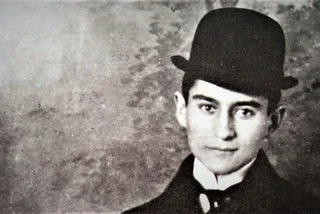An open-air art gallery hidden near the National Theatre displays a series of large portraits of smiling people in windows. The faces are in sharp contrast to the dilapidated facade, which still bears the scars of a massive gas explosion in 2013.
The windows, which are still boarded up, are used as an art gallery called Fasáda. They will be home to Mirroring Happiness, featuring 14 photos by artist and filmmaker Jakub Jahn, until Feb. 20, 2024. The damaged building is opposite the rectangular complex that houses the SmetanaQ gallery on the side that faces the Vltava.
Despite its location in the center of Prague, Fasáda is easy to miss. Divadelní Street runs under the National Theatre and has very little foot traffic. A staircase leading to it from Národní Street is currently under construction so the only way to reach the gallery is either through a dark tunnel or via a circuitous route around the block.
Inspiration from positive psychology
Jahn has become interested in positive psychology, which aims to improve the quality of life rather than focusing on mental illness. He uses this concept in most of his recent work and recently spoke about the topic for the June issue of the Czech magazine Psychologie Dnes.
His portraits for Mirroring Happiness were inspired by the work of Italian psychologist Giacomo Rizzolatti, who has explored the idea of mirror neurons. These nerve cells can cause someone to mimic the behavior and expressions they observe in someone else, so seeing the smiles on happy faces should make the observer want to smile as well, Jahn said at the opening of the exhibition.
"The exhibition is about the wonderful qualities of all of us – about the ability to empathize with others, about the fact that when we observe someone experiencing happiness or joy, we ourselves experience happiness or joy," Jahn said. His Instagram page and website feature the quote: "We're all works of art." He takes that idea into his work, trying to capture the essence of his subjects.

The people in the photos are a cross-section of society. The group includes conceptual artist Jiří Kovanda, MMA wrestler Jiří Procházka, fashion designer Olo Křížová, as well as Jahn’s wife and a man who sells magazines in the street. Jahn showed all of them a video compiled from YouTube clips of situations where people behaved nicely or showed kindness to each other. Jahn recorded the audience's reactions using a camera placed behind a semi-transparent mirror.
This series of upbeat photos serves as a counterpoint to another of his recent projects meant to end experimentation on animals, which the NGO Animal Freedom sponsord. Jahn showed videos of experiments to a wide range of people, including some celebrities, and captured the looks of horror on their faces. The video received over 1 million views on the first day, without paid advertising. A related petition got over 75,000 signatures.
Greetings and gratitude
Another one of his recent projects, called Heartbeat, is an effort to create a universally understood greeting that is not tied to a particular culture. Its inspiration was the COVID-19 pandemic, which made it impossible to use traditional greetings like handshakes or hugs that involved contact. The heartbeat greeting involved tapping on your chest.
"Even though each of us is unique, beneath the surface there is a beating human heart in all of us," he said. The greeting was created from the position of art, which is a universal language for all of us, he added.
One of his long-term projects is Czech Gratitude, an endeavor to create the world’s largest collection of letters that express thanks. Images of the letters are used to make posters, pamphlets, and stencils seen and distributed across Czechia. The results are documented via photos and videos. Anyone in the country can participate by sending in a letter that expresses thanks for at least three things.












 Reading time: 3 minutes
Reading time: 3 minutes 




























